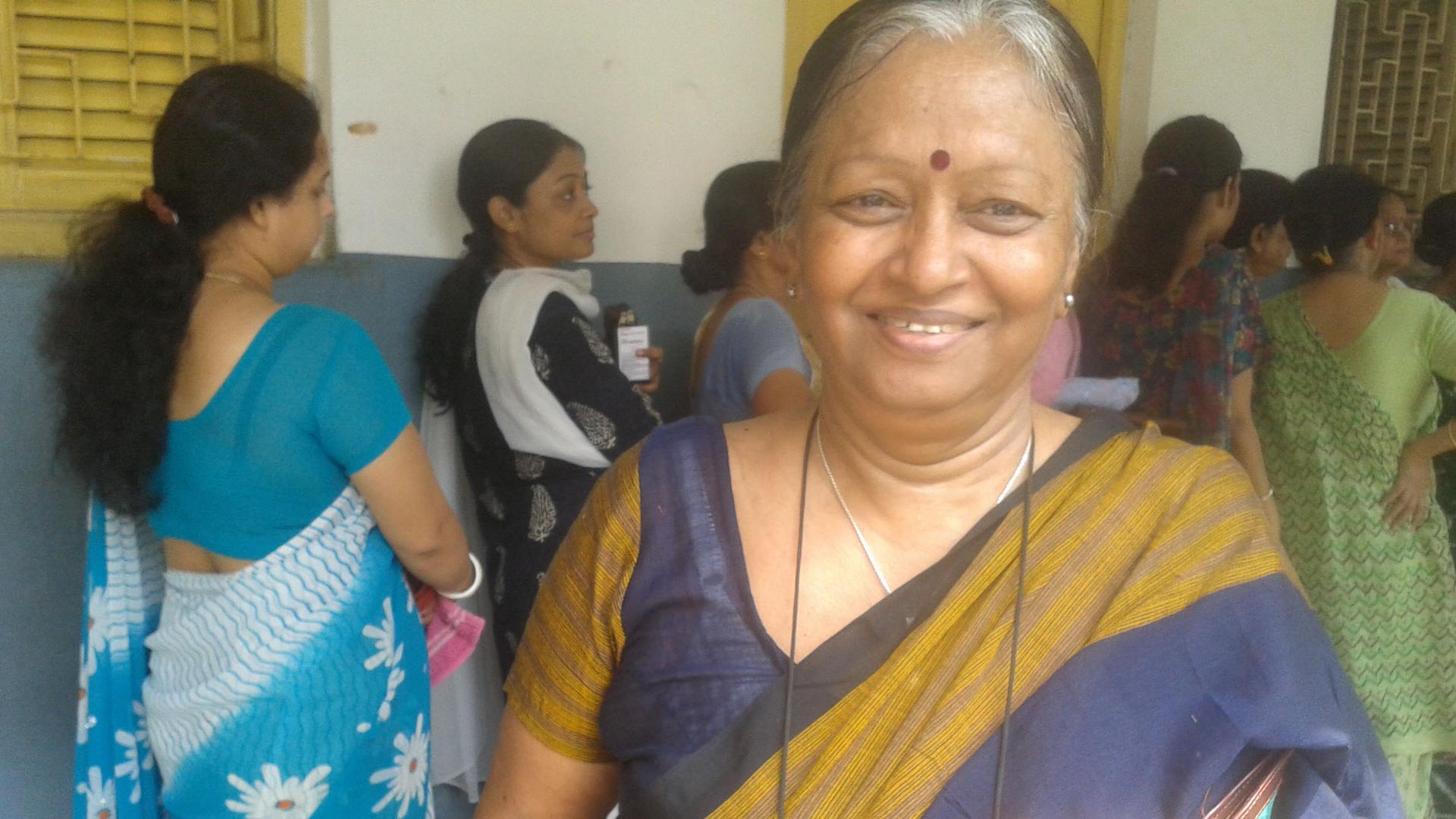The polls close in India, five weeks and half a billion voters later
Reporter Rhitu Chatterjee’s mother went to the polls to cast her vote Monday in Kolkata.
I landed in Kolkata at around eight this morning.
My father was waiting with a car to take me home to Kalyani, the sleepy, green suburb where my parents live.
As we left the airport, the city looked empty. Offices and businesses were closed and there were few vehicles on the road. But the citizens of Kolkata were up and lining up outside their polling booths, bringing to close the five-week-long parliamentary election in the country.
It was a hot day, with highs around 106°F but no one seemed to mind the heat. In fact, there was a celebratory air to the day. Women were dressed in bright saris and men in cotton tunics and trousers, all headed to polling stations.
When we reached home, my mother handed us each a glass of cold lassi (a traditional yogurt drink), and by the time we were done draining it down our throats, she hurriedly ushered us out of the house.
“Let’s go,” she said. “I need to vote before it gets too crowded.”
She smiled as she said this, her smile brightened by the bright ochre yellow border on her deep blue sari. (It was a sari I'd brought her from Sri Lanka, and I was happy to see she'd chosen to wear it today.)
I knew my mother took voting seriously but I was surprised at the level of her enthusiasm and how it seemed to have made her forget or at least temporarily overcome the ailments that have kept her mostly confined to home lately.
You see, rheumatoid arthritis and other chronic health issues have restricted her movement in recent years. She walks slowly and with a limp that seems to have become permanent. But she wouldn’t let the ailments keep her from exercising her basic right as an Indian citizen. And so we went to her polling station, a school in the neighborhood.
There were long queues outside every room, and an armed policeman keeping guard. Soon, it was my mother's turn. She went past the policeman at the door and disappeared into the dark room with several officials and a voting machine.
Less than 10 minutes later, my mother emerged from the room, beaming as she showed me her ink-covered index finger, a sign that she had voted. I beamed back, a proud daughter. I hadn't intended my trip home to coincide with election day, but I couldn't have been happier it turned out this way.
I landed in Kolkata at around eight this morning.
My father was waiting with a car to take me home to Kalyani, the sleepy, green suburb where my parents live.
As we left the airport, the city looked empty. Offices and businesses were closed and there were few vehicles on the road. But the citizens of Kolkata were up and lining up outside their polling booths, bringing to close the five-week-long parliamentary election in the country.
It was a hot day, with highs around 106°F but no one seemed to mind the heat. In fact, there was a celebratory air to the day. Women were dressed in bright saris and men in cotton tunics and trousers, all headed to polling stations.
When we reached home, my mother handed us each a glass of cold lassi (a traditional yogurt drink), and by the time we were done draining it down our throats, she hurriedly ushered us out of the house.
“Let’s go,” she said. “I need to vote before it gets too crowded.”
She smiled as she said this, her smile brightened by the bright ochre yellow border on her deep blue sari. (It was a sari I'd brought her from Sri Lanka, and I was happy to see she'd chosen to wear it today.)
I knew my mother took voting seriously but I was surprised at the level of her enthusiasm and how it seemed to have made her forget or at least temporarily overcome the ailments that have kept her mostly confined to home lately.
You see, rheumatoid arthritis and other chronic health issues have restricted her movement in recent years. She walks slowly and with a limp that seems to have become permanent. But she wouldn’t let the ailments keep her from exercising her basic right as an Indian citizen. And so we went to her polling station, a school in the neighborhood.
There were long queues outside every room, and an armed policeman keeping guard. Soon, it was my mother's turn. She went past the policeman at the door and disappeared into the dark room with several officials and a voting machine.
Less than 10 minutes later, my mother emerged from the room, beaming as she showed me her ink-covered index finger, a sign that she had voted. I beamed back, a proud daughter. I hadn't intended my trip home to coincide with election day, but I couldn't have been happier it turned out this way.
The story you just read is accessible and free to all because thousands of listeners and readers contribute to our nonprofit newsroom. We go deep to bring you the human-centered international reporting that you know you can trust. To do this work and to do it well, we rely on the support of our listeners. If you appreciated our coverage this year, if there was a story that made you pause or a song that moved you, would you consider making a gift to sustain our work through 2024 and beyond?
